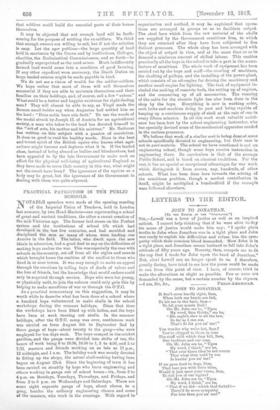PRACTICAL PATRIOTISM IN THE PUBLIO SCHOOLS.
NOTABLE speeches were made at the opening meeting of the Imperial Union of Teachers, held in London last summer, by two Head-Masters—one representing a school of great and ancient traditions, the other a recent creation of the mid-Victorian age. The former laid stress on the Prefect system and the institutions of school life which had developed in the last five centuries, and had moulded and disciplined the men so many of whom were leading our Armies in the field. The latter, who dwelt upon the new ideals in education, had a good deal to say on the difficulties of making boys realize the war. This was especially the case with schools in the country, cut off from all the sights and sounds which brought home the realities of the conflict to those who lived in or near towns. It was easy enough to make an appeal through the emotions by tolling boys of deeds of valour and the loss of friends, but the knowledge that would endure could only be acquired through service. Boys who. were too young, or physically unfit, to join the colours could only gain this by helping to make munitions of war or through the O.T.O.
As a practical commentary on this suggestion, it may be worth while to describe what has been done at a school where a hundred boys volunteered to make shells in the school workshops during the summer holidays. Since that time the workshops have been fitted up with lathes, and the boys have been at work turning out shells. In the summer holidays, after the O.T.O. camp was over, continuous work was carried on from August 5th to September 2nd by three gangs of boys—about twenty to the gang—who were employed for ten days each. The boys camped in the cricket pavilion, and the gangs were divided into shifts of ten, the hours of work being 8 to 10.30, 10.30 to 1, 2 to 4.30, and 5 to 7.30, masters and friends working on as late as II p.m., 12 midnight, and 1 a.m. The holiday work was mostly devoted to fitting up the shops, the actual shell-making having been begun on August 23rd. Since the beginning of term it has been carried on steadily by boys who learn engineering and others working in gangs out of school hours—viz., from 2 to 4 p.m. on Mondays, Tuesdays, Thursdays, and Fridays, and from 2 to 6 p.m. on Wednesdays and Saturdays. There are some eight separate gangs of boys, about eleven to a gang, besides the ordinary engineering classes and some of the masters, who work in the evenings. With regard to
organization and method, it may be explained that opera. Lions are arranged in groups so as to facilitate output, The steel bars which form the raw material of the shells are supplied by the Government munitions firm, to which they are returned after they have been subjected to five distinct processes. The whole shop has been arranged with the object of output in view, and at the same time so as to demand a minimum amount of skilled labour. This enables practically all the boys in the school to take a part in the manu- facture of munitions. The whole work of equipment has been carried out by the boys and staff—the erecting of machines, the shafting of pulleys, and the installing of the power-plant, which consists of an oil-engine for driving the machinery and another small engine for lighting. The task of equipment in- cluded the making of concrete beds, the setting up of engines, and the connecting up of all accessories. The running of the cable for the electric light has also been done in the shop by the boys. Everything is now in working order, each lathe and machine doing its part and being capable of keeping up a continuous supply of shell at the rate of one in every fifteen minutes. In all this work most valuable assist- ance has been lent by the school engineering instructor, who has specially devised some of the mechanical apparatus needed in the various processes.
We believe that work of a similar sort is being done at some schools specifically devoted to engineering, but their case is not in pari matcria. The school we have mentioned is not an engineering school, though some boys receive instruction in engineering there. Its curriculum is that of the average Public School, and is based on classical traditions. For the rest, it has no special or exceptional advantages for war work which distinguish it from scores, nay, hundreds, of other schools. What has been done here towards the solving of the munitions problem, though a modest contribution in itself, might be multiplied a hundredfold if the example were followed elsewhere.






































 Previous page
Previous page